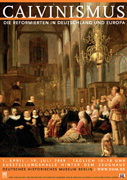


Exhibiton
| I. Calvin and Geneva
| II. The Confession
| III. The Reformed Alliances
IV. Discipline and Republic
| V. Iconoclasm and New Pictorial Worlds
VI. The Word of God
| VII. The New Order of Life
| VIII. Traditions
Various Reformed groups developed out of the reformation of the Church initiated by Martin Luther. They were particularly active in the southwest areas of the Holy Roman Empire and in Switzerland. All Reformers invoked the Gospels, abolished fasting and celibacy, and suppressed the veneration of the saints. Of the seven sacraments of the Old Church they recognized only baptism and the Lord’s Supper.
Despite the commonalities there were no few theological disputes among the various groups, especially with regard to the Eucharist. For Reformed Protestants the bread and wine symbolized their fellowship with Christ. The Lutherans held the view that the Son of God was present in the bread and wine. By contrast, the Catholic Church taught that the bread and wine in the Eucharist transformed themselves into the body and blood of Christ.
These differences could not be overcome in the course of numerous religious discussions. They found expression in various confessions of faith in which the respective theological convictions were formulated. Unlike Lutheranism, which had laid down its binding creed since 1530 in the Confessio Augustana, Reformed Protestantism brought forth a great variety of confessional statements. The Heidelberg Catechism of 1563 and the Second Helvetian Confession of 1566 were circulated and implemented throughout Europe.
With the Religious Peace of Augsburg of 1555 the Lutherans came to a relatively secure position in the empire and set down a uniform creed in the Formula of Concord of 1577. The Reformed Protestants, on the other hand, were long denied formal recognition. Their status as third denomination was first accorded them in the Peace of Westphalia from the year 1648.
